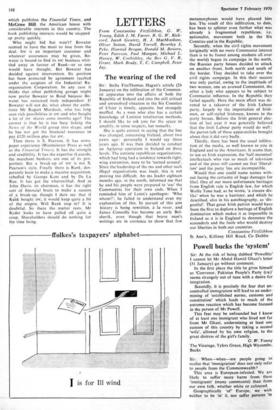LETTERS
From Constantine FitzGibbon, G. W. Young, Edith J. M. Farrer, R. G. W. Rick- cord, Jacob Gewirtz, H. J. MacMoolson, Oliver Sutton, David Torvell, Beverley J. Pyke, Diarmid Brogan, Donald M. Bowers, Peter Paterson, Paul Mangan, Michael L. Hussey, W. Corbishley, the Rev G. V. R. Grant, Mark Brady, T. C. Campbell, Peter Jay.
The wearing of the red
Sir: Stella FitzThornas Hagan's article (24 January) on the infiltration of the Commun- ist apparatus into the affairs of both the Republic of Ireland and into the still critical and unresolved situation in the Six Counties of Ulster is timely, apposite, but strangely muffled. As a man who also has a certain knowledge of Leninist totalitarian methods, I should like to ask you for the space to amplify, in some respects, her remarks.
She is quite correct in saying that the line was changed, concerning Ireland, about two years ago: personally I would say three years ago. It was then decided to conduct an Agitprop operation in Ireland on three levels. The extreme republican organisations, which had long had a tendency towards right, wing extremism, were to be 'turned around'. Since the leadership of the IRA and other such illegal organisations was inept, this is not proving too difficult. An IRA leader eighteen months ago, in the north, informed me that he and his people were prepared to 'use' the Communists for their own ends. When I reminded him of Lenin's apothegm: 'Who whom?', he failed to understand even my explanation of this. In pursuit of this aim history is being rewritten, a la russe, and James Connolly has become an early Bol- shevik, even though that brave man's writings are in existence to show that few metamorphoses would have pleased him less. The result of this infiltration, to date, has been to splinter even further what was already a fragmented republican, i.e. nationalist, movement both in the Six Counties and in the Republic.
Secondly, when the civil rights movement (originally with no more Communist interest than is to be found among students all over the world) began its campaign in the north, the Russian party bosses decided to attack on another front, both north and south of the border. They decided to take over the civil rights campaign. In this their success was only partial, owing to the ineptitude of two women, one an avowed Communist, the other a lady who appears to be subject to Communist influence. In the Republic they failed equally. Here the main effort was de- voted to a takeover of the Irish Labour party, largely by the importation of Irish- men, or self-styled Irishmen, known to the party bosses. Before the Irish general elec- tion of last year it was generally believed that the Irish Labour party would do well: the parrot-talk of these apparatchiks brought about that it did very badly.
Thirdly, there has been the usual infiltra- tion of the media, so well known to you in England and to the Americans. It seems that, to use an Irish expression, the 'half-mounted' intellectuals who run so much of television and of the press still cannot see that 'liberal- ism' and the party line are incompatible.
Would that one could name names with- out facing the certainty of huge damages for libel. One of our more unfortunate heritages from English rule is English law, for which Wolfe Tone had, as he wrote, 'a sincere dis- like' when he was a barrister, and which he described, also in his autobiography, as 'dis- gustful'. That great Irish patriot would have been the first to deplore a heritage of English domination which makes it as impossible in Ireland as it is in England to denounce the scoundrels and the fools who would destroy our liberties in both our countries.
Constantine FitzGibbon St Ann's, Killiney Hill Road, Co Dublin


































 Previous page
Previous page